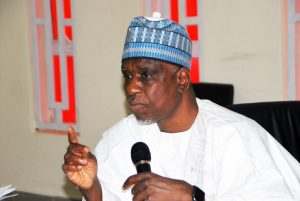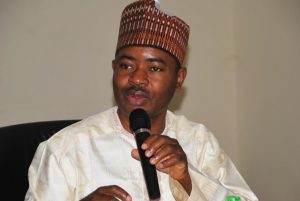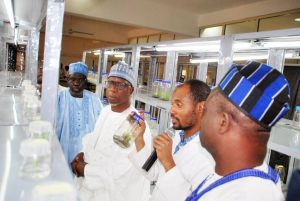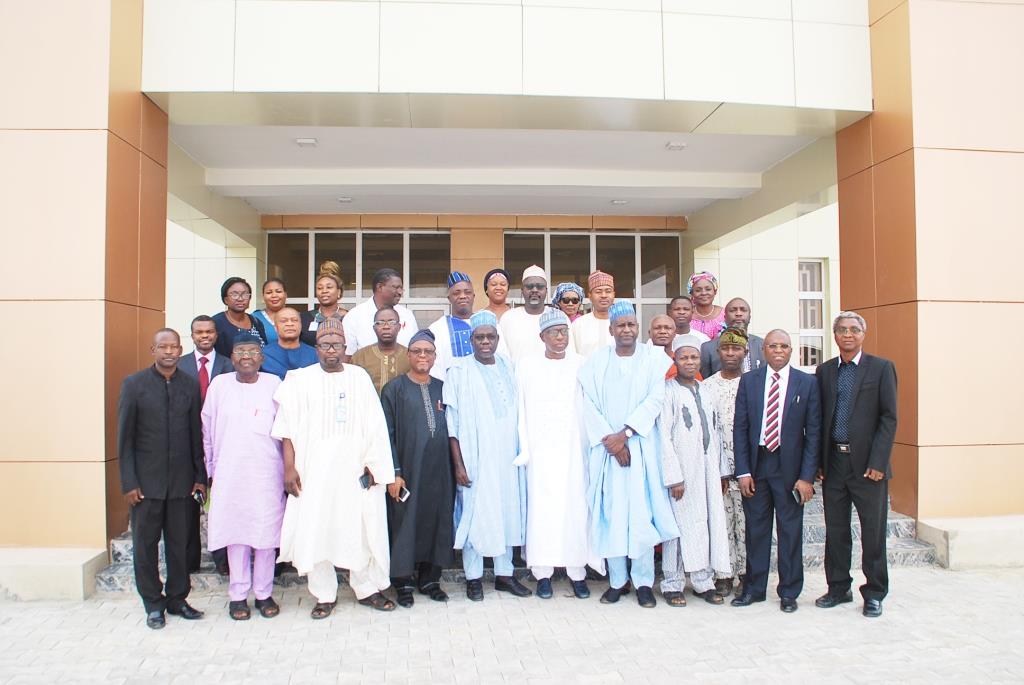All 10 Nigerian Africa Centres of Excellence (ACEs) have set machinery in motion for the attainment of international accreditation of their programmes, a major Disbursement-Linked Indicator (DLI) of the World Bank-assisted ACE project. This follows the accreditation of more than 96 per cent of the programmes of the ACEs by the National Universities Commission (NUC). This national accreditation is another DLI of the Project.
Announcing the results of the accreditation exercise during the 4th meeting of the National Project Performance Review Committee (NPPRC), which took place on 20 April, 2017, at the Africa Centre of Excellence in Dryland Agriculture (CDA), Bayero University, Kano, the Executive Secretary, NUC and Chairman of the NPPRC, Professor Abubakar A. Rasheed, stated that, out of 82 programmes that were presented by the ACEs for accreditation, only three failed. He noted that failing the three programmes was not a punitive measure but, rather, to ensure that only programmes which were sustainable beyond the expiration of funds from the World Bank were approved to be run by the Centres.

Chairman, NPPRC, Prof. Abubakar A. Rasheed
The Chairman reminded the Centres that they were expected to pursue excellence, while focusing on few areas. He encouraged them to set limited and attainable targets for themselves and advised that other programmes, which had passed the resource verification exercise but did not make the accreditation exercise could be mounted in relevant Faculties of the universities-provided action was taken to remedy identified deficiencies-so as not to overburden the ACEs.
Achieving international accreditation, a major milestone for the Nigerian University System (NUS), Professor Rasheed said, would enable the ACEs to put Nigerian universities on the world map. He congratulated the Vice-Chancellors of participating universities, Centre Leaders and the NUC ACE Secretariat for the successful conduct of the national accreditation exercise and urged principal officers of the ACEs to adopt quality assurance mechanisms that would entrench excellence in the activities of their Centres.
In keeping with the project objective of promoting regional specialisation amongst universities in participating countries within the West and Central African sub-region, to address common regional development challenges and strengthen their capacities to deliver high quality training and applied research, the programmes being offered by the 10 ACEs include, but are not limited to MSc. Intelligent Systems Engineering, MSc. and PhD Molecular Biology and Genomics, MSc. and PhD Pharmacognosy, MSc. Food Chemistry, MSc. Food Physics, Master of Food Supply Economics, MSc. and PhD Post Harvest Physiology and Management of Crops as well as MSc. and PhD Materials Science and Engineering.
Others are MSc. Gas Refining and Petrochemical Engineering; PhD Petroleum and Gas Engineering, M. Ag.SE and Ph.D. Ag.SE Food Processing and Value Addition; MSc. and PhD Crop and Pasture Production and Sustainable Environment, MSc. and PhD Livelihoods and Natural Resource Economics, MSc. and PhD Crop and Cropping System in Drylands Agriculture, PGD Forensic Biotechnology, MSc. and PhD Biotechnology, PGD, MSc. and PhD Reproductive Health Economics, Master of Public Health (Reproductive Health) and PhD Public Health, among others.
Professor Rasheed noted that the aim of the NPPRC meeting was to review the progress of the Project as well as address issues germane to its success, such as the need to promote collaboration among ACEs within similar fields, prior to partnerships with foreign universities. These collaborations would enable Centre Leaders to share resources among one another and equip them to win future grants.
The Executive Secretary encouraged the Universities to cultivate the habit of funding the Centres and devise means of incentivising faculty within the ACEs. He reminded members of the World Bank’s position that the Centres would not be allowed to pay bonuses to staff from the grant. He noted that the impact of the ACE project on Nigerian universities would be evident in the long-run and encouraged staff not to view incentives in monetary terms, as it could be detrimental to the progress of the Project.
The Chairman lamented the lack of interest of research institutes in the activities of the Centres, despite government’s huge investments in them and the relevance of the ACEs to the research institutes. He informed members that a meeting would be convened by the Ministry of Science and Technology, for the heads of research institutes and the Nigerian University System (NUS), with NUC representing the Universities, to explore means of supporting research activities in Nigerian universities, particularly the ACEs.

Project Coordinator, Dr. Joshua Atah
Delivering a report on the progress of the ACEs, the National Project Coordinator, Dr. Joshua Atah, highlighted the challenges of the ACEs, such as the lack of incentives for faculty involved in the Project and difficulty in attracting regional students, especially females. Other challenges include securing placements for students’ internships and the lack of interest of research institutes in the activities of the Centres.
Joining the meeting via Webex, World Bank Education Specialist, Ms. Himdat Bayusuf, commended the Executive Secretary’s efforts at moving the Project forward, which was evident in the appreciable progress recorded by a majority of the Nigerian ACEs. She said that she was delighted at the Vice-Chancellors and Centre Leaders’ ownership of the Projects in their various universities, noting that most of the performing Centres were those who were being supported by their university management. Ms. Bayusuf urged the ACEs to, not only learn from each other’s experiences, but also, leverage on each other’s strengths.
Earlier in his welcome remarks, the Vice-Chancellor, BUK, Professor Muhammad Yahuza Bello, noted that this was the first meeting of the NPPRC to be held outside Abuja. He called for a rotation of subsequent meetings of the Committee round member-institutions, to afford the Centres the opportunity to share experiences and learn from each other, thereby gleaning best practices. Professor Bello re-iterated the need for better collaboration among the ACEs which, he noted, was key to the success of the Project in Nigeria.
In a vote of thanks, the Vice-Chancellor, University of Port Harcourt, Professor Ndowa E. S. Lale, commended the commitment of the Executive Secretary to the success of the ACE project. He thanked the NUC ACE Secretariat for providing the much-needed leadership and guidance to the Centres and also commended the Centre Leaders for devotedly nurturing the ACEs.
Professor Lale expressed appreciation to the Vice-Chancellor, BUK for the hospitality accorded members, adding that the University had set the standard for subsequent meetings. He applauded the Vice-Chancellor’s dedication to, not only the development of CDA, but the University, as a whole. He noted that the University had enjoyed a succession of exceptional Vice-Chancellors (including Professor Attahiru Jega and Abubakar Rasheed), which had resulted in the rapid, yet steady growth of the University.
A highlight of the meeting was a tour of the Centre for Dryland Agriculture (CDA), led by the Centre Leader, Professor Jibrin M. Jibrin. Facilities visited included the 25-seater GIS Laboratory and the Tissue Culture Laboratory, where plant cells are cultured, prior to replanting. Other facilities visited were the 100-seater Conference Room, a video-conference room, reading rooms, a central laboratory and lecture rooms.

The Deputy Director, Research and Outreach, Dr.Kabir Mustapha (second right), explaining a research process at the Tissue Culture Laboratory of the Africa Centre of Excellent for DrylandAgriculure, Bayero University, Kano, to the Executive Secretary, NUC, Prof. Abubakar Rasheed; while the Vice Chancellor, Prof. Yahuza Bello (left) listens with keen interest

